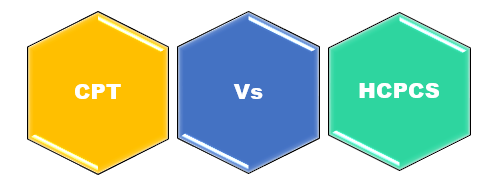CPT Vs HCPCS
Current Procedural Terminology
Current Procedural Terminology (or CPT) is a code set maintained by the American Medical Association (AMA) through the CPT Editorial Panel. It was designed to describe medical, surgical, and diagnostic services accurately. It is also used as a form of uniform communication among physicians, coders, patients, accreditation organizations, and those who pay for administrative, financial, and analytical purposes about certain medical procedures and services.
CPT operates in three categories: Standard CPT Codes, CPT Codes specific for performance measurement, and CPT Codes that are specific for emerging technology.
In terms of public knowledge, the CPT Codes are not particularly private; however, because the AMA holds the sole copyright to the codes, they have mandated that anyone interested in finding out the codes must pay a license fee –for those who want to compare the Relative Value Unit (RVU) values to the CPT codes. As such, the AMA receives upwards of $70 million per annum from these fees alone.
Healthcare Common Procedure Coding System
Healthcare Common Procedure Coding System (or HCPCS) is a set of health care procedure codes based on CPT. It was designed to provide a standardized coding system in order to describe specific items and services that are provided when health care is delivered. It is a necessary form of coding for anyone who carries Medicare, Medicaid, and other health insurance programs in order to ensure that insurance claims are processed efficiently.
HCPCS operates on three separate levels: Level I is the AMA’s numeric CPT coding; Level II consists of alphanumeric codes that include non-physician services (for instance, ambulance services and prosthetic devices); Level III codes (also known as local codes) were developed by the state Medicaid agencies, Medicare contractors, and private insurers to be used in specific jurisdictions for specific programs.
As far as the HCPCS is concerned, the practices are public record and can be accessed freely by those who use Medicare, Medicaid, or any other private insurer to ensure that practices are being followed accurately. Though the use of codes was voluntary at its inception, beginning in 1996 the Health Insurance Portability and Accountability Act made it mandatory for this information to be easily accessible by physicians, technicians, and patients alike.

